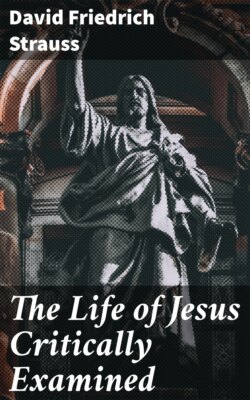Читать книгу The Life of Jesus Critically Examined - David Friedrich Strauss - Страница 29
На сайте Литреса книга снята с продажи.
Оглавление[Contents]
§ 15.
DEFINITION OF THE EVANGELICAL MYTHUS AND ITS DISTINCTIVE CHARACTERISTICS.
Table of Contents
The precise sense in which we use the expression mythus, applied to certain parts of the gospel history, is evident from all that has already been said; at the same time the different kinds and gradations of the mythi which we shall meet with in this history may here by way of anticipation be pointed out.
We distinguish by the name evangelical mythus a narrative relating directly or indirectly to Jesus, which may be considered not as the expression of a fact, but as the product of an idea of his earliest followers: such a narrative being mythical in proportion as it exhibits this character. The mythus in this sense of the term meets us, in the Gospel as elsewhere, sometimes in its pure form, constituting the substance of the narrative, and sometimes as an accidental adjunct to the actual history.
The pure mythus in the Gospel will be found to have two sources, which in most cases contributed simultaneously, though in different proportions, to form the mythus. The one source is, as already stated, the Messianic ideas and expectations existing according to their several forms in the Jewish mind before Jesus, and independently of him; the other is that particular impression which was left by the personal character, actions, and fate of Jesus, and which served to modify the Messianic idea in the minds of his people. The account of the Transfiguration, for example, is derived almost [87]exclusively from the former source; the only amplification taken from the latter source being—that they who appeared with Jesus on the Mount spake of his decease. On the other hand, the narrative of the rending of the veil of the temple at the death of Jesus seems to have had its origin in the hostile position which Jesus, and his church after him, sustained in relation to the Jewish temple worship. Here already we have something historical, though consisting merely of certain general features of character, position, etc.; we are thus at once brought upon the ground of the historical mythus.
The historical mythus has for its groundwork a definite individual fact which has been seized upon by religious enthusiasm, and twined around with mythical conceptions culled from the idea of the Christ. This fact is perhaps a saying of Jesus such as that concerning “fishers of men” or the barren fig-tree, which now appear in the Gospels transmuted into marvellous histories: or, it is perhaps a real transaction or event taken from his life; for instance, the mythical traits in the account of the baptism were built upon such a reality. Certain of the miraculous histories may likewise have had some foundation in natural occurrences, which the narrative has either exhibited in a supernatural light, or enriched with miraculous incidents.
All the species of imagery here enumerated may justly be designated as mythi, even according to the modern and precise definition of George, inasmuch as the unhistorical which they embody—whether formed gradually by tradition, or created by an individual author—is in each case the product of an idea. But for those parts of the history which are characterized by indefiniteness and want of connexion, by misconstruction and transformation, by strange combinations and confusion,—the natural results of a long course of oral transmission; or which, on the contrary, are distinguished by highly coloured and pictorial representations, which also seem to point to a traditionary origin;—for these parts the term legendary is certainly the more appropriate.
Lastly. It is requisite to distinguish equally from the mythus and the legend, that which, as it serves not to clothe an idea on the one hand, and admits not of being referred to tradition on the other, must be regarded as the addition of the author, as purely individual, and designed merely to give clearness, connexion, and climax, to the representation.
It is to the various forms of the unhistorical in the Gospels that this enumeration exclusively refers: it does not involve the renunciation of the historical which they may likewise contain.
